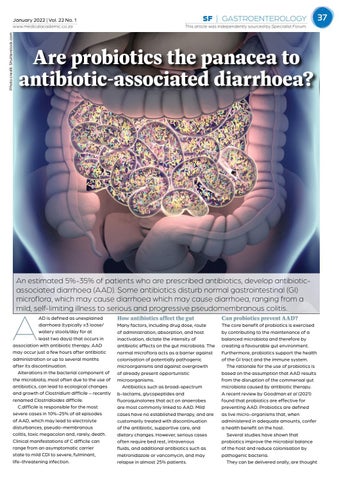SF | GASTROENTEROLOGY
January 2022 | Vol. 22 No. 1 Photo credit: Shutterstock.com
www.medicalacademic.co.za
This article was independently sourced by Specialist Forum.
Are probiotics the panacea to antibiotic-associated diarrhoea?
An estimated 5%-35% of patients who are prescribed antibiotics, develop antibioticassociated diarrhoea (AAD). Some antibiotics disturb normal gastrointestinal (GI) microflora, which may cause diarrhoea which may cause diarrhoea, ranging from a mild, self-limiting illness to serious and progressive pseudomembranous colitis.
A
AD is defined as unexplained diarrhoea (typically ≥3 loose/ watery stools/day for at least two days) that occurs in association with antibiotic therapy. AAD may occur just a few hours after antibiotic administration or up to several months after its discontinuation. Alterations in the bacterial component of the microbiota, most often due to the use of antibiotics, can lead to ecological changes and growth of Clostridium difficile – recently renamed Clostridioides difficile. C.difficile is responsible for the most severe cases in 10%-25% of all episodes of AAD, which may lead to electrolyte disturbances, pseudo-membranous colitis, toxic megacolon and, rarely, death. Clinical manifestations of C difficile can range from an asymptomatic carrier state to mild CDI to severe, fulminant, life-threatening infection.
How antibiotics affect the gut
Can probiotics prevent AAD?
Many factors, including drug dose, route of administration, absorption, and host inactivation, dictate the intensity of antibiotic effects on the gut microbiota. The normal microflora acts as a barrier against colonisation of potentially pathogenic microorganisms and against overgrowth of already present opportunistic microorganisms. Antibiotics such as broad-spectrum b-lactams, glycopeptides and fluoroquinolones that act on anaerobes are most commonly linked to AAD. Mild cases have no established therapy, and are customarily treated with discontinuation of the antibiotic, supportive care, and dietary changes. However, serious cases often require bed rest, intravenous fluids, and additional antibiotics such as metronidazole or vancomycin, and may relapse in almost 25% patients.
The core benefit of probiotics is exercised by contributing to the maintenance of a balanced microbiota and therefore by creating a favourable gut environment. Furthermore, probiotics support the health of the GI tract and the immune system. The rationale for the use of probiotics is based on the assumption that AAD results from the disruption of the commensal gut microbiota caused by antibiotic therapy. A recent review by Goodman et al (2021) found that probiotics are effective for preventing AAD. Probiotics are defined as live micro-organisms that, when administered in adequate amounts, confer a health benefit on the host. Several studies have shown that probiotics improve the microbial balance of the host and reduce colonisation by pathogenic bacteria. They can be delivered orally, are thought
37













